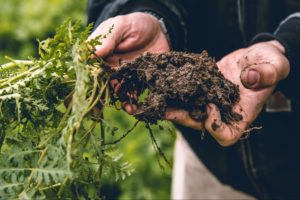Roadmap Points Way to Better Soil Health in New York
The Cornell-led New York Soil Health Initiative has just released its Soil Health Roadmap, which identifies ways farmers and land managers can adopt better soil health practices.

Soil at a cover crop demo event co-hosted by the Cornell Soil Health Program and the American Farmland Trust.
Jenn Thomas-Murphy / Cornell Soil Health Program
There is a revolution of sorts going on in farming today, triggered by discoveries in plant and soil ecology, and a recognition that we will need to restore the health of our soils to feed an expanding population.
New York has been a leader in this soil health revolution, but where do we go from here? This is the focus of the recently released New York Soil Health Roadmap, a collaborative effort of the New York Soil Health (NYSH) initiative coordinated by Cornell.
The roadmap identifies key policy, research and education efforts to overcome barriers to adoption of soil health practices by farmers. It also identifies strategies for integrating soil health goals with state priorities focused on environmental issues such as climate change and water quality.
Roadmap contributors developed four goals for advancing soil health. The goals include overcoming barriers to wider adoption of soil health practices, and the integration of climate change adaptation and mitigation in all aspects of soil health programming.
As a resource for policymakers, researchers, farmers and those concerned about healthy food and a healthy environment, the roadmap comprises input from many individuals, organizations and government agencies in New York and nationally. It is intended to help expand soil health policy, research and outreach efforts to reach New York’s underserved.
“This roadmap highlights the linkages between soil, water and air quality,” said David Wolfe, Cornell professor of plant and soil ecology and leader of the project. “It was impressive to see how such a diverse group of stakeholders was able to find consensus on a few key goals that address some of our most urgent environmental challenges while supporting the long term success of our farms.”
It is ultimately farmers and other land managers who must make adjustments – which could be costly and/or risky – in order to rebuild healthy soils, according to Wolfe. The roadmap discusses the results of a 2018 New York farmer survey focused on economic issues, and found that while some benefits can take years to be fully realized, others – such as avoiding soil-erosion losses with cover crops, and reducing fuel and labor costs by reducing tillage – can pay off in the near term for the farmer.
“We need to get in front of soil health or we’ll fall behind, and we’re not going to like the dust that gets kicked up,” said Donn Branton, who farms 1,500 acres of grain crops and vegetables in Stafford, New York. Branton gave up traditional tillage on his farm in 1988, and incorporates other conservation practices, including cover crops and nutrient and drainage management.
Farmers in New York are facing uncertainty about the climate and extreme weather events. Increasing soil organic matter – a key to soil health – improves resilience to both drought and flooding, and stores carbon in the soil that would otherwise be in the air as carbon dioxide, a greenhouse gas.
Healthy soils are also less prone to soil erosion and nutrient runoff during heavy rainfall, reducing an economic loss for farmers while protecting the water quality of streams and lakes.
New York Soil Health’s vision is to strengthen the state’s leading role in soil health research, outreach and policy with effective partnerships. In 2018, NYSH hosted a soil health summit in Albany to gather input from stakeholders. The summit brought together experts from 35 organizations to discuss shared agricultural and environmental interests and form solutions.
Attendees considered the unique features of New York agriculture, which is dominated by mixed animal-crop dairy farms as well as economically important fruit and vegetable crops. New York ranks among the biggest producers in the nation for many of these crops.
“After working on this roadmap for over a year, I’m more optimistic than ever about the sustainability of New York’s diverse agriculture,” said Wolfe, a faculty fellow at Cornell’s Atkinson Center for a Sustainable Future. “We not only have innovative farmers rebuilding their soils, but also a wide range of allies, from consumers to policymakers, who are ready to support them.”
This article also appeared in the Cornell Chronicle.


The increasing awareness of the importance of soil health. Healthy soils are essential for growing healthy crops, and they also play a vital role in storing carbon, filtering water, and supporting biodiversity. The development of new technologies that can help farmers to farm more sustainably. cambiati These technologies include precision agriculture, cover cropping, and no-till farming. This farming revolution is still in its early stages, but it has the potential to transform the way we produce food. If we are successful, we can create a more sustainable and equitable food system that can feed an expanding population without destroying our planet.
Great to see New York taking the lead in soil health initiatives. The roadmap focus on collaboration and addressing environmental challenges aligns well with the urgency of sustainable farming practices.
Long Term Care Insurance Services in Brea CA